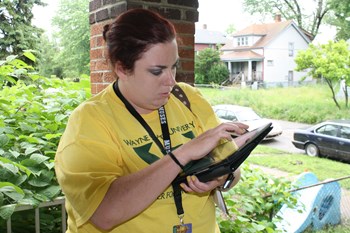Healthy homes
The Healthy Homes unit supports eliminating housing-based health hazards for at-risk populations through research, performance management systems and facilitation. The unit is deeply involved in local and national efforts to eliminate environmental hazards from homes through the following initiatives and programs:
Learn about our current work with GHHI in Southwest Detroit
Healthy Homes Case Management System (HHCMS)
The HHCMS was developed to collect, store and manage data related to Healthy Homes projects across multiple sites and across multiple projects. Developed by the Center for Urban Studies at Wayne State University in 2011, and funded by The Kresge Foundation for use by CLEARCorps Detroit in its activities related to Healthy Homes, the HHCMS now hosts data for seven geographical sites working on projects for federal initiatives and philanthropic foundations. The HHCMS is a web-based platform that maintains and analyzes data for these sites, and programmers create and personalize additional documents as needed on Healthy Homes work across the United States.
For more information, visit our Healthy Homes Case Management System page or contact Lyke Thompson at ad5122@wayne.edu or 313-577-5209.
Detroit Lead Partnership (DLP)
The mission of the DLP is to facilitate coordination, advocate for and monitor the progress of efforts to prevent and eliminate lead poisoning and other environmental health problems in the children of Detroit. In 2012, 2,327 children in Detroit were identified with elevated blood lead levels (>5 µg/dL) even though less than 44% of children considered "high risk" were screened for lead poisoning (Michigan Department of Community Health). Health Department estimates show that at least 6,772 children in Michigan have some level of lead poisoning. It is imperative that agencies committed to a solution develop a rational, coordinated plan to ensure best use of limited resources, avoid duplication and develop positive cross agency relationships.
U.S. Department of Housing and Urban Development (HUD)
HUD has adapted and is distributing for use an English/Welsh rating tool, the Housing Health and Safety Rating System (HHSRS). The U.S. version will be called the Healthy Homes Rating Tool (HHRT). It is intended to assess home health hazards and to guide home improvements for the HUD Healthy Homes Production Grants. This tool has substantial potential to produce systematic measurement of 29 different hazards occurring in American housing units. This has broad significance to identifying and remedying health hazards in American housing.
 The HHRS 3-City Study, from the Center for Urban Studies at Wayne State University (CUS), seeks to examine the adaptation of the HHSRS (as the HHRT) for the U.S., investigating the ratings produced and the reliability of those ratings. In this project, assessments are being conducted with partners in three cities. CLEAR Corps in Detroit, MI, the Alameda County Healthy Homes Department in Oakland, Calif., and the Greensboro Housing Coalition in Greensboro, N.C. will conduct 500 assessments each in their communities. They will use both the HHRS developed in Britain and the American adaptation, the HHRT. The results of these assessments will be analyzed by CUS to meet the following objectives.
The HHRS 3-City Study, from the Center for Urban Studies at Wayne State University (CUS), seeks to examine the adaptation of the HHSRS (as the HHRT) for the U.S., investigating the ratings produced and the reliability of those ratings. In this project, assessments are being conducted with partners in three cities. CLEAR Corps in Detroit, MI, the Alameda County Healthy Homes Department in Oakland, Calif., and the Greensboro Housing Coalition in Greensboro, N.C. will conduct 500 assessments each in their communities. They will use both the HHRS developed in Britain and the American adaptation, the HHRT. The results of these assessments will be analyzed by CUS to meet the following objectives.
- The first objective of this study is to assess the extent to which housing hazards measured by the Healthy Homes Rating Tool (HHRT) vary across cities in the U.S. when compared to England.
- The second objective is to assess the reliability of assessments completed using the HHRT.
- The third overall objective is to test the effect on assessors of providing likelihood's and outcomes based upon U.S. (or even local) data. The fourth objective is to assess the effect of training on assessment quality and reliability.
Read more about the findings from the initial use of the Health Homes Rating System
Detroit Healthy Homes Database (DHHDB)
The Center also continues to develop and expand the Healthy Homes Data and Information System, now referred to as the Detroit Healthy Homes Database. This database had previously focused on collecting data on lead poisoning, inspections and abatements. Through agreements with several other local organizations including the Michigan Department of Community Health (MDCH), Wayne Metro Community Action Agency and the City of Detroit Police and Fire Departments, we have been able to expand the information received to include data on asthma, weatherization and EMS 911 calls. This data is primarily provided as a list of addresses where reports, inspections, or other healthy homes work has been done. This has also been recently expanded to include maps illustrating where healthy homes-related incidents are higher and lower at zip code and census track levels. Much of the data for the DHHDB is being updated when new information is available.
To learn more about keeping your home safe and healthy, please see our Freqently Asked Questions page.